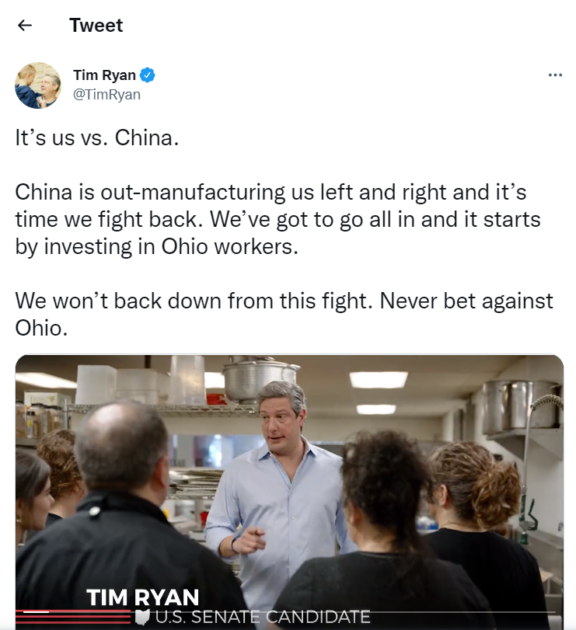Tim Ryan, Ohio Senate hopeful, recently tweeted out this ad, writing above that “it’s us against China,” and sharing a video showing the Senate candidate speaking out against China in various campaign rallies.
Opposition to China has indeed been a dominant aspect of his campaign. It was a point that he even brought to Capital during a campaign visit to Campus Democrats, much to the surprise of those who attended including myself.

Ryan’s rhetoric seems to be part of a sort of patriotic or even nationalistic progressivism which sees policies such as the PRO Act, wage increases, and expanding social services as part of a noble quest to defeat Chinese industry and manufacturing in an effort to recover America’s status as an industrial superpower. On the page for his campaign site, his section on “Cutting Workers in On the Deal” highlights his condemnation of China’s actions as a bad actor almost immediately after laying out some of his policy goals.
On its face, this may seem like a great strategy. Many of these policies have been maligned by accusations of being socialistic by conservatives, so to frame it as a way to help America fight China’s Communist Party would seemingly be a genius way to sugarcoat these goals for a right-leaning audience.
Unfortunately for Congressman Ryan, we live in a world with a history that makes this rhetoric dangerous. Especially given recent history, it is surprising that no one noticed the Trumpian nature of such a method within the Ryan campaign.
Primary competitor Morgan Harper did notice, sharing a video comparing speeches of Tim Ryan and Donald Trump to illustrate the concerning parallel.
When the COVID-19 pandemic broke out, conservatives rushed to pin the outbreak on China, referring to the virus with several racialized monikers and spreading a conspiracy that the country had developed it as a bioweapon. From 2020 to 2021, hate crimes against Asians and Pacific Islanders consequently increased by 146 percent. These actions were motivated by fear-mongering politicians pandering to the insecurities of primarily white Americans regarding non-white individuals.
This violence would manifest itself in the killings of eight people in Atlanta last year, when the shooter in question specifically sought to kill Asian women.
We see what this rhetoric does, and this is hardly a new development.
America has a long history of anti-Asian prejudice, specifically when it comes to issues of labor competition and anxiety over non-white coworkers. The Chinese Exclusion Act of 1882 was motivated by the reactionary trope of immigrants stealing jobs and preceded by race riots, which targeted Chinese-American communities. This would later be followed by the creation of internment camps for Japanese-Americans during the Second World War.
In the 1980s, Asian-Americans earned the “model minority” label due to the stereotype that Asian-Americans were generally more successful than other groups. This coincided with the decline of the American auto industry in favor of Japanese competitors, resulting in emboldened resentment among Americans. It culminated in the murder of Vincent Chin in 1982, who was beaten to death by two white autoworkers at Chrysler that blamed China for the decline of automotive manufacturing.
In summary, Tim Ryan should know better than to try to tap into American economic anxiety in this way. Even if it brings him electoral victory, we have seen the consequences of this rhetoric before– all of us within our lifetimes, in fact.
I do not believe Tim Ryan intends to spark anti-Asian American violence; I am sure he is genuine in his perception of China’s economic policies as a threat to American labor and America’s economy and that his intentions are good. I do not believe he must avoid the topic altogether. But, those intentions do not matter once death and violence are on the table. We have heard this story much too often before and must condemn ethnic scapegoating everywhere it exists.

